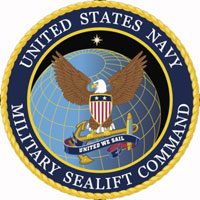 The Military Sealift Command (MSC) operates approximately 125 replenishment and military transport ships to support the US Navy. Currently, MSC has more ships than it has civilian mariners to sustainably operate them. MSC’s commander confirmed Thursday that the command will sideline 17 ships to ease the stress on civilian mariners.
The Military Sealift Command (MSC) operates approximately 125 replenishment and military transport ships to support the US Navy. Currently, MSC has more ships than it has civilian mariners to sustainably operate them. MSC’s commander confirmed Thursday that the command will sideline 17 ships to ease the stress on civilian mariners.
“That number’s based on again the number of mariners that we need to get us to 95 percent [manning],” Rear Adm. Philip Sobeck told reporters in a call Thursday morning. “It is aligning the force so that we are most ready and that we are getting after the fleet requirements.”
MSC crews the Navy’s logistics and support vessels, with 4,500 billets across the command. There are about 5,500, or 1.27 mariners per billet, to fill positions on an MSC ship. That ratio means a mariner is at sea for four months, off for one month and then must return to work. The new move will allow mariners more time on shore.
“If you’re required to have 100 people on a vessel. There are only 27 more people on shore at any given time to rotate those crew members,” one former MSC mariner told USNI News over the summer.
While Sobeck didn’t say it during the call, USNI News previously reported that sidelining the ships would add 600 to 700 more civilian mariners to the pool and up the ratio to 1.75 mariners per billet. Sobeck said the service is trying to hire and retain more mariners to improve that ratio for all vessels MSC needs to crew and eventually bring the sidelined ships back into active service.
Sobeck spoke to reporters as the Navy announced a new “workforce initiative” it says will help with the civilian mariner shortage. Navy Secretary Carlos Del Toro greenlit the new plan on Oct. 30, according to a service news release.
“The [operational tempo] has just gone to a point where we have to do something different,” Sobeck said Thursday. “The plan was again to focus on … regain[ing] the mariner pool and [getting] the foundation back intact.”
“The initiative will also include crew reassignments to higher priority vessels and the placement of some MSC logistics support ships into extended maintenance periods,” reads the release. “Rotating crews to higher priority vessels will minimize overdue reliefs and provide a more predictable work environment for civil service mariners.”
Sobeck declined to specify which hulls would go into extended maintenance, but confirmed the Navy would reduce manning on two Expeditionary Sea Bases, Spearhead-class Expeditionary Fast Transports (EPF), T-AGOS ocean surveillance ships, T-AKE dry cargo and ammunition ships and replenishment oilers. For the EPFs, Sobeck said the service is figuring out what to do with the new ones coming off the production line in Mobile, Ala.

Laying up all these ships is not going to do much as the EPF’S only have a crew of 22 to 26 people fully manned and most of them will not go back to the big fleet as they think they will. Why they are so short on people is because MSC has forgotten about the mariner And treats them like they are nothing anymore they could care less about the mariners how have been with them for years and let the new mariners do what they want to forcing the old mariners to quit or retire early and they don’t care even though accident have skyrocketed because the newcomers have no idea what they are doing and expect the old timers to teach them without getting anything for it. They really need to look at themselves instead of us mariners.
Ee
I want to work for MSC you make so hard to get in I put 20 years in the Navy I was a BM love to work for MSC but I can work on my paper while working for MSC please make easy to get there I want to work for MSC. I am ready to work with MSC help me and I will help me, Ypu need people on ships need to find away,the process needs to change, I hear ready to work, I can work on my paper work while onboard ship, I will have my passport iyour process take to much time I just give up, help me , there have to be another way come on I have hard all my life, I am ready to be with MSC, thank you
S